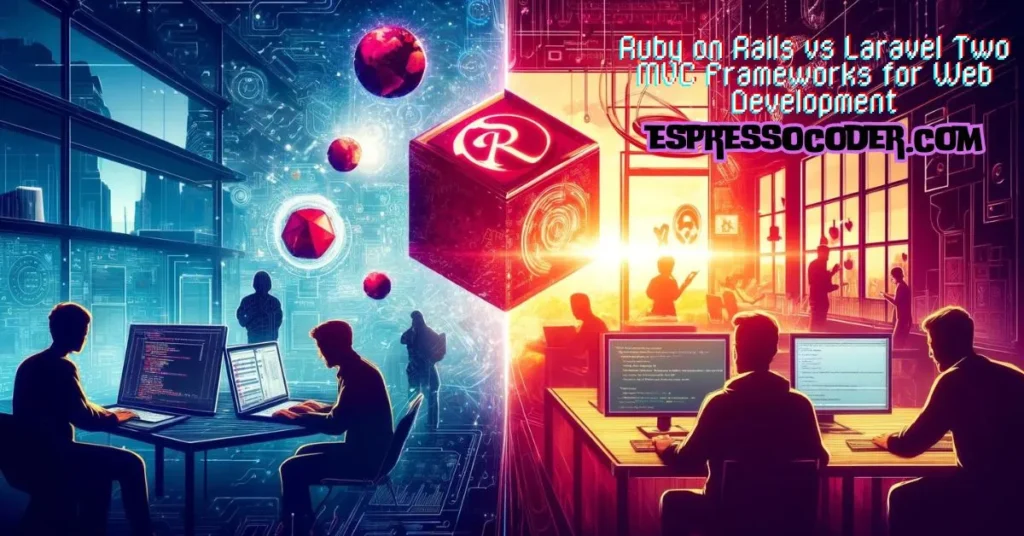Choosing the right framework can significantly impact the success and efficiency of your project. Two of the most popular frameworks often used for comparison are Ruby on Rails and Laravel.
Whether you hire Ruby on Rails developers or Laravel developers, both frameworks help build apps more quickly and with less code, but they cater to different types of projects and developer preferences.
Contents
What Is Ruby on Rails
Ruby on Rails is an open-source web application framework that uses the Ruby programming language. It follows the convention over configuration (CoC) principle and the don’t repeat yourself (DRY) philosophy. Rails is aimed at simplifying the process of writing apps for the web by making certain assumptions, such as, what each developer should do to begin.
It is a tool that allows you to perform multiple tasks with small code and it is more powerful than many other languages and frameworks available. Rails was introduced in 2005 and has been used by big companies like Airbnb, GitHub, and Shopify. This fact is pretty great proof of its reliability and power.
Core Features and Benefits
- Rapid Development
Rails emphasizes convention over configuration and the active record pattern, speeding up the development process.
- Adaptability
Despite myths, Rails is adaptable, as evidenced by platforms like Shopify and Hulu, which handle massive volumes of traffic and transactions.
- Rich Libraries (Gems)
Rails boasts a rich ecosystem of gems that extend the functionality of apps without a lot of new coding.
What Is Laravel
In the meantime, Laravel is a PHP framework for web artisans, increasing to be elegant syntax that is easy to understand, and yet very effective to use. Like Rails, it follows the MVC (Model-View-Controller) architectural pattern, but it is designed to provide a more enjoyable developer experience without sacrificing application functionality.
Two years after it was launched in 2011, Laravel has become a hit, to say the least, due to its rich features like the power of background job processing, event broadcasting in real-time, and others.
Core Features and Benefits
- Eloquent ORM
Laravel’s ORM (Object-Relational Mapping) is one of the most advanced PHP frameworks, allowing for simple and quick database interactions.
- Task Scheduling
An intuitive interface for task scheduling that consolidates the cron jobs typically needed to schedule recurring tasks.
- Blade Templating
Unlike other PHP templating engines, the blade is Laravel’s powerful templating engine, which does not restrict you from using plain PHP code in your views.
Ruby on Rails vs Laravel
- Learning Curve
Rails
Rails’ philosophy of ‘convention over configuration’ means there is less to learn upfront. However, mastering Rails requires understanding its conventions deeply, which can be a steep learning curve for some developers.
Laravel
Laravel is famous because of the feature that it is easy to learn, especially for those who already know PHP. Its extensive documentation and Laracasts (a dedicated tutorial site) provide excellent learning resources.
- Community Support
Rails
Rails has a very mature and supportive community. There are some resources like RailsGuides, Stack Overflow, and numerous blogs and forums that offer help and insights.
Laravel
Although younger, Laravel’s community is vibrant and growing. Laracasts support it, extensive documentation, and a large developer community contributing to its ecosystem.
- Performance and Security
Both frameworks provide strong mechanisms to handle security issues, such as SQL injection, cross-site scripting (XSS), and cross-site request forgery (CSRF). Performance-wise, both frameworks are competent with proper optimization, but Laravel might require additional tweaking to reach the same response times as a Rails application due to its architecture.
Conclusion
The choice between Ruby on Rails and Laravel largely depends on your project requirements, your team’s expertise, and your personal or organizational preference for Ruby or PHP. Both frameworks offer different benefits and have been successfully used in production environments for major projects around the world.











